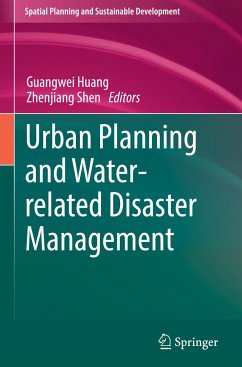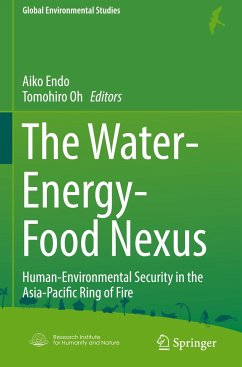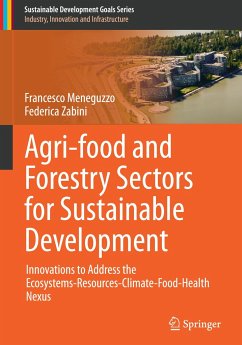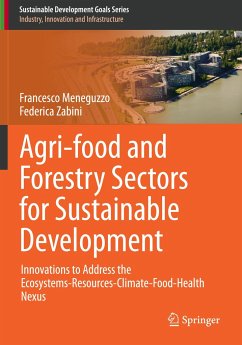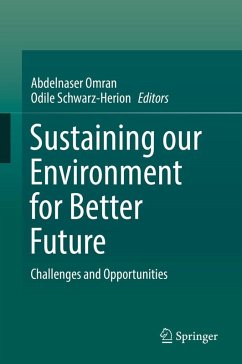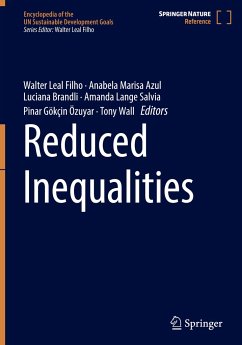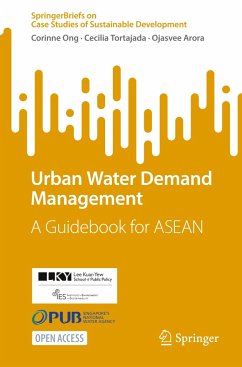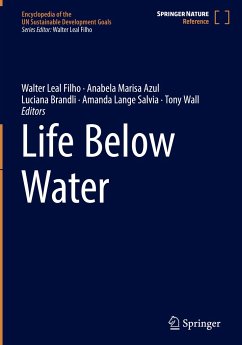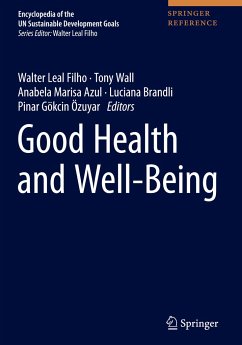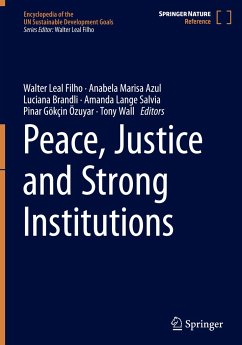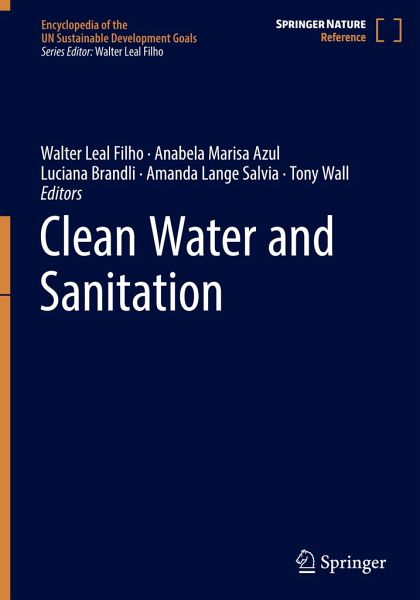
Clean Water and Sanitation
Versandkostenfrei!
Versandfertig in 6-10 Tagen
453,99 €
inkl. MwSt.

PAYBACK Punkte
227 °P sammeln!
The problems related to the process of industrialisation such as biodiversity depletion, climate change and a worsening of health and living conditions, especially but not only in developing countries, intensify. Therefore, there is an increasing need to search for integrated solutions to make development more sustainable. The United Nations has acknowledged the problem and approved the "2030 Agenda for Sustainable Development". On 1st January 2016, the 17 Sustainable Development Goals (SDGs) of the Agenda officially came into force. These goals cover the three dimensions of sustainable develo...
The problems related to the process of industrialisation such as biodiversity depletion, climate change and a worsening of health and living conditions, especially but not only in developing countries, intensify. Therefore, there is an increasing need to search for integrated solutions to make development more sustainable. The United Nations has acknowledged the problem and approved the "2030 Agenda for Sustainable Development". On 1st January 2016, the 17 Sustainable Development Goals (SDGs) of the Agenda officially came into force. These goals cover the three dimensions of sustainable development: economic growth, social inclusion and environmental protection.
The Encyclopedia of the UN Sustainable Development Goals comprehensively addresses the SDGs in an integrated way. It encompasses 17 volumes, each devoted to one of the 17 SDGs. This volume is dedicated to SDG 6 "Ensure availability and sustainable management of water andsanitation for all". Water and sanitation are fundamental to human well-being. Integrated water resources management is essential to ensure availability and sustainable management of water and sanitation for all and to the realization of Sustainable Development.
Concretely, the defined targets are:
Achieve universal and equitable access to safe and affordable drinking water for allAchieve access to adequate and equitable sanitation and hygiene for all and end open defecation, paying special attention to the needs of women and girls and those in vulnerable situationsImprove water quality by reducing pollution, eliminating dumping and minimizing release of hazardous chemicals and materials, halving the proportion of untreated wastewater and substantially increasing recycling and safe reuse globallySubstantially increase water-use efficiency across all sectors and ensure sustainable withdrawals and supply of freshwater to address water scarcity and substantially reduce the number of people suffering from water scarcity Implement integrated water resources management at all levels, including through transboundary cooperation as appropriateProtect and restore water-related ecosystems, including mountains, forests, wetlands, rivers, aquifers and lakes Expand international cooperation and capacity-building support to developing countries in water- and sanitation-related activities and programmes, including water harvesting, desalination, water efficiency, wastewater treatment, recycling and reuse technologiesSupport and strengthen the participation of local communities in improving Uwater and sanitation managementEditorial Board
Ulisses M. Azeiteiro, Anabela Marisa Azul, Luciana Brandli, Dominique Darmendrail, Despo Fatta-Kassinos, Walter Leal Filho, Susan Hegarty, Amanda Lange Salvia, Albert Llausàs, Paula Duarte Lopes,Javier Marugán, Fernando Morgado, Wilkister Nyaora Moturi, Karel F. Mulder, Alesia Dedaa Ofori, Sandra Ricart
The Encyclopedia of the UN Sustainable Development Goals comprehensively addresses the SDGs in an integrated way. It encompasses 17 volumes, each devoted to one of the 17 SDGs. This volume is dedicated to SDG 6 "Ensure availability and sustainable management of water andsanitation for all". Water and sanitation are fundamental to human well-being. Integrated water resources management is essential to ensure availability and sustainable management of water and sanitation for all and to the realization of Sustainable Development.
Concretely, the defined targets are:
Achieve universal and equitable access to safe and affordable drinking water for allAchieve access to adequate and equitable sanitation and hygiene for all and end open defecation, paying special attention to the needs of women and girls and those in vulnerable situationsImprove water quality by reducing pollution, eliminating dumping and minimizing release of hazardous chemicals and materials, halving the proportion of untreated wastewater and substantially increasing recycling and safe reuse globallySubstantially increase water-use efficiency across all sectors and ensure sustainable withdrawals and supply of freshwater to address water scarcity and substantially reduce the number of people suffering from water scarcity Implement integrated water resources management at all levels, including through transboundary cooperation as appropriateProtect and restore water-related ecosystems, including mountains, forests, wetlands, rivers, aquifers and lakes Expand international cooperation and capacity-building support to developing countries in water- and sanitation-related activities and programmes, including water harvesting, desalination, water efficiency, wastewater treatment, recycling and reuse technologiesSupport and strengthen the participation of local communities in improving Uwater and sanitation managementEditorial Board
Ulisses M. Azeiteiro, Anabela Marisa Azul, Luciana Brandli, Dominique Darmendrail, Despo Fatta-Kassinos, Walter Leal Filho, Susan Hegarty, Amanda Lange Salvia, Albert Llausàs, Paula Duarte Lopes,Javier Marugán, Fernando Morgado, Wilkister Nyaora Moturi, Karel F. Mulder, Alesia Dedaa Ofori, Sandra Ricart



